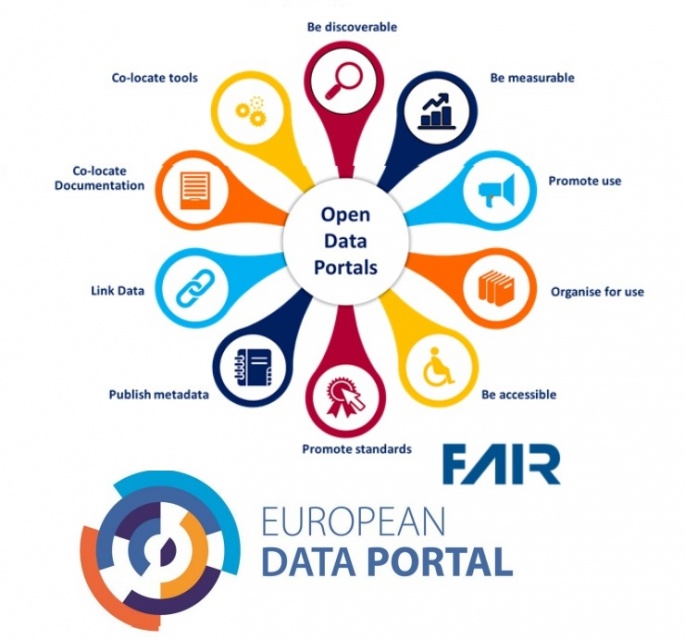Build sustainable Open Data Portals with European Data Portal practical guide
27/10/2017


Image sources: Analytical Report 8: The Future of Open Data Portals - - European Data Portal - - DataPorlatals.org
Data Portals play an essential role in the promotion of Open Data practices across within each country and region, as they represent central points to publish and access datasets. In order to ensure such data infrastructures remain relevant over time, a series of aspects should be considered and embedded in the design stages of any Open Data portal.
|
The European Data Portal Report: The Future of Open Data Portals (26 pp.) presents |
a point of view of sustainability of Open Data infrastructures and recommends 10 ways (or indicators) portals can be organised to add value over time :
|
1. Organising for use of the datasets (rather than simply for publication).
|
2. Learning from the techniques utilised by recently emerged commercial data marketplaces; promoting use via the sharing of knowledge, co-opting methods common in the open source software community. |
|
3. Investing in discoverability best practices, borrowing from e-commerce. |
4. Publishing good quality metadata, to enhance reuse. |
|
5. Adopting standards to ensure interoperability. |
6. Co-locating tools, so that a wider range of users and re-users can be engaged with. |
|
7. Linking datasets to enhance value.
|
8. Being accessible by offering both options for big data, such as Application Programme Interfaces, and options for more manual processing, such as comma separated value files, thus ensuring a wide range of user needs are met. |
|
9. Co-locating documentation, so that users do not need to be domain experts in order to understand the data. |
10. Being measurable, as a way to assess how well they are meeting users’ needs. |
While walking readers through the ten items list, the report provides examples of success stories for each section.
|
With an ever growing and more and more diverse Open Data community, such recommendations should be addressed in a timely manner. An easy-to-use guide proposed by the European Data Portal aims to enhance user engagement, foster quality, enable usage metrics, promote re-use of data and standards, co-locate documentation, as well as benefit from linked data and data visualisation tools. |
"It is hoped this list will be operationalised by portals by looking critically at their offering and taking an honest inventory; by addressing front end issues to meet user needs; by engaging with data providers not only to deliver the content in appropriate formats but also to share their domain knowledge; and finally, by engaging with other portals to solve joint challenges, primarily those of standards".
Download : Analytical Report 8: The Future of Open Data Portals
Related content:
- UK Data Archive
- EU Open Data Portal
- DataFirst is a research data service dedicated to making South African and other African survey and administrative microdata available to researchers and policy analysts
- DSpace-GLAM based on DSpace-CRIS : Manage, Analyze & Preserve your digital heritage
- Initiatives and resources pushing in support of Open Science
- openAFRICA : the largest independent repository of open data on the African continent
- The State of Open Data - DigitalScience / FigShare Report 2017
- Introduction to Open Data Policies in H2020 : Presentation delivered by Nancy Pontika (OU) during the OpenAIRE/FOSTER Open Access Week webinars on October 25 2017
- Open Standards, Data, Source, and Innovation as Principles for Digital Development
- Providing researchers with the skills and competencies they need to practise Open Science (Open Science Skills Working Group Report, EC 2017)
- Why Open Research?
- Point of View: How open science helps researchers succeed (eLIFE)
- opensource.com
- re3data.org : check out for Research Data Repositories
- METADATA 2020 : towards Metadata as the Scholarly Community’s top priority
- The Linked Open Research Cloud (LORC) : connected, findable, and accessible scientific knowledge
- Recorded (ANDS) - FAIR Data Webinar series
- Recorded OPENAIRE/FOSTER OPEN ACCESS WEEK 2017 WEBINARS
- 4 RDA Recommendations for Open Data Sharing - now published as ICT Technical Specifications
- Developing Data Interoperability using standards: A Wheat Community use case
- Help FOSTER promote Open Science and contribute !
-
Developing Criteria to Establish Trusted Digital Repositories
- CoreTrustSeal Certification Launched (September 2017)
- ICSU-WDS : Trusted Data Services for Global Science
- Towards Trusted Digital Repositories : accessing, sharing and using quality data
- NISO Publishes Standards Tag Suite (NISO STS) Standard (October 2017) : provides common format for exchanging standards content
- An Overview of SHACL (SHAPES Constraint Language) : a powerful, recently released W3C standard for data modeling, ontology design, data validation, inferencing and data transformation
